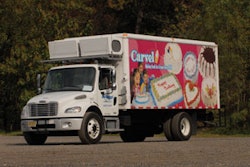Mt. Holly, NC: At an event at the Daimler Truck factory in Mt. Holly, NC, President Obama launched EV-Everywhere, the second in a series of Energy Department "Clean Energy Grand Challenges" aimed at addressing the most pressing energy challenges of our time. The EV Everywhere Challenge will bring together America's best and brightest scientists, engineers, and businesses to work collaboratively to make electric vehicles more affordable and convenient to own and drive than today's gasoline-powered vehicles within the next 10 years.
This announcement is part of President Obama's all-of-the-above approach energy strategy to protect American consumers from high gas prices over the long-term by offering consumers cost-effective alternatives to gasoline-powered vehicles and helping to reduce the country's dependence on foreign oil.
"The Energy Department's Clean Energy Grand Challenges will engage America's scientists, engineers and young people to solve some of the nation's biggest energy challenges and make clean energy technologies affordable and accessible to the vast majority of American families and businesses," said Secretary Chu. "The EV-Everywhere Challenge is focused on advancing electric vehicle technologies and continuing to reduce costs, so that a decade from now, electric vehicles will be more affordable and convenient to own than today's gasoline-powered vehicles."
Electric vehicles can offer consumers significant advantages over gasoline-powered vehicles, including savings on fuel costs, added convenience, and reduced maintenance costs. Electricity is cheaper than gasoline to power a vehicle – generally equivalent to less than $1 per gallon – and consumers are able to conveniently fuel up at home. Electric vehicles can also be more reliable, require less maintenance, and offer the same or better driving performance compared to today's gasoline-powered vehicles. And winning the EV-Everywhere Challenge will put the US in the lead to manufacture and export the next generation of advanced electric vehicles and electric vehicle components, creating good paying manufacturing jobs and stimulating the American economy.
American automakers and automotive suppliers are currently pioneering the way forward in getting the first wave of electric vehicles into the hands of a significant number of US drivers. But today, the prices of these cars are still out of reach for the majority of American families. This Department-wide initiative, which will bring together DOE's Office of Energy Efficiency & Renewable Energy's Vehicle Technologies Program, the Office of Science, and ARPA-E, will aim to make electric vehicles affordable to the average American family by specifically targeting dramatic technological and cost improvements in batteries, electric motors, power electronics, light-weight structures, and fast charging technology.
The aggressive goal of this initiative is, by the year 2022, to enable companies in the United States to be the first in the world to produce a 5-passenger affordable American electric vehicle with a payback time of less than 5 years and sufficient range and fast-charging ability to enable average Americans everywhere to meet their daily transportation needs more conveniently and at lower cost.
The Challenge will involve working with industry, universities, our national laboratories and government partners to set technical goals for cutting costs for the batteries and electric drivetrain systems, including motors and power electronics, reducing the vehicle weights while maintaining safety, and increasing fast-charge rates. As part of this process and to inspire and recruit the best and brightest American scientists, engineers, and businesses to tackle this electric vehicle grand challenge Secretary Chu and the Department of Energy will be organizing a series of EV-EVerywhere Challenge workshops across the country over the next few months.
With support from the Energy Department, private industry and DOE's national laboratories have already achieved significant advances in electric vehicle and advanced battery technologies, reducing costs and improving performance significantly from even a few years before. For example, one of the Department's grantees, Envia Systems, announced last week at the ARPA-E Energy Innovation Summit that they have achieved a major breakthrough in battery R&D: doubling the energy density for lithium-ion batteries and setting the world record for energy density in rechargeable lithium-ion batteries. The breakthrough could result in a 50 percent reduction in the price of the battery on a 300-mile range electric vehicle, and came several years ahead of initial projections.
The EV-Everywhere Challenge is the second of the Energy Department's Grand Challenges, following the model of the $1/watt SunShot Challenge, which seeks to make solar power directly cost-competitive with electricity from fossil fuels by the end of the decade. Over the next few months, the Department of Energy will announce a series of additional Grand Challenges, each focused on pursuing technical innovations and reductions in cost that will enable clean energy technologies to compete directly, without subsidies, with the energy technologies that are currently in wide use today.



















